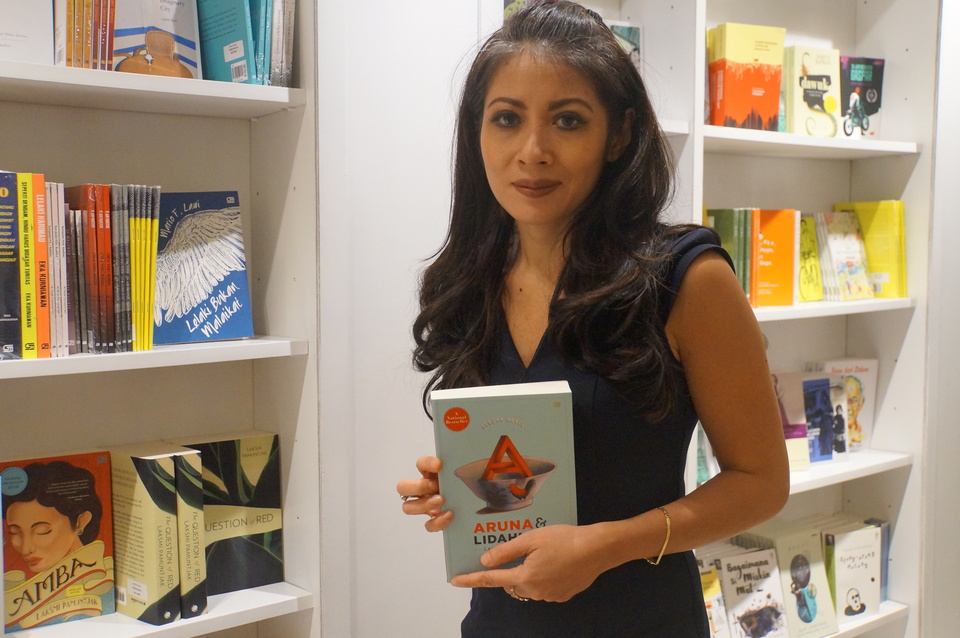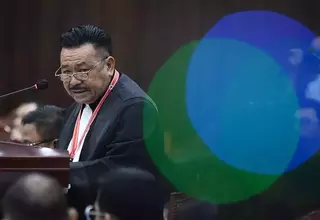Aruna the Birdwoman and Her Sophisticated Palate

Jakarta. News broke out two months ago that Palari Films was cooking up an adaptation of Laksmi Pamuntjak’s foodie novel, "Aruna dan Lidahnya," or "The Birdwoman’s Palate." The Jakarta Globe managed to pin down the constantly mobile Laksmi on Friday (20/07) at Aksara Kemang, the newly relaunched hipster bookstore that Laksmi co-founded in 2001, to talk about her thoughts on the film, the challenges of incorporating the story’s many layers and dealing with what she called a "dream cast."
Laksmi said the idea to turn the novel into a movie came from director Edwin and actor Nicholas Saputra just a month after the book was released in November 2014.
"We started talking, very casually, about adapting the book into a film since the end of that year. Since then, we traveled a lot. I did the European book tour for my first novel ["Amba" or "The Question of Red"] and was hardly ever in Jakarta. Edwin and Nicholas also did a lot of traveling, as it happened. But from time to time we got together to discuss the film," Laksmi said.
Edwin, one of the best avant-garde filmmakers Indonesia has produced in the last decade, joined Palari Films in 2017 to make his first commercial flick, the teen drama "Posesif."
Palari went on board with the idea of filming "Aruna" with Edwin's long-time collaborator Meiske Taurisia and Muhamad Al Zaidy as producers.
Filming for Aruna was wrapped up in April 2018, and the film is now in post-production.
Laksmi said she was convinced to give the film a go by Edwin’s "aesthetic visions."
"I like his reading of the novel. He saw the things that I thought were also interesting. I just felt we were kindred spirits from the start," she said.
The script was written by Titien Wattimena, who also worked with Edwin on the omnibus "Belkibolang" (2011) and on his lyrical masterpiece "Kebun Binatang" ("Postcards from the Zoo," 2012).
"I saw one draft of the script. I did give some feedback, but that was it. Minimal interference was my byword. I let them do their work, let them do what they’re best at," Laksmi said.
Dream Cast
Laksmi gushed about the film's cast, saying she "couldn’t have asked for [a] better [set of actors]" since each of them "gets" their character "almost to a T."
"Did I write the characters in the book for these actors?" Laksmi laughed. "They're so invested in the characters emotionally. There were beautiful dynamics between them. And almost everyone was a foodie!"
The novel tells the story of Aruna (Dian Sastrowardoyo), a foodie and an epidemiologist who is tasked to investigate Avian Flu cases in Indonesia.
Aruna saw the assignment as an opportunity to take her friends along – food critic Nadezhda (Hannah Al Rashid), chef Bono (Nicholas Saputra) and her anti-foodie colleague Farish (Oka Antara) – on a journey to different cities in Indonesia and get a taste of the country's diverse culinary delights.
Laksmi said she realizes the actors' physical appearances don’t exactly match the characters in the book.
Aruna, for example, is a plump and not conventionally attractive young woman in the book.
Dian, meanwhile, has been the epitome of Indonesian beauty since she first broke into the scene as high school babe Cinta in the classic teen drama "Ada Apa Dengan Cinta?"
However, Laksmi said having "the right spirit" for the characters finally triumphs over being faithful to their physical attributes.
"Aruna in the novel was supposed to be plain and a a bit shy, a little withdrawn and unsure of herself. She has a lot of opinion but tends to hold back. When I first heard Dian Sastro was going to play her, of course I thought, 'Oh, but she’s too pretty.' But she's shown she's a versatile actor," Laksmi said.
Another thing that counts in Dian's favor is her passion for food, to the extent that she now runs MAM by 3 Skinny Minnies, a restaurant at Senayan City.
Laksmi said the other actors also slotted in nicely to their characters. Hannah Al Rashid, for example, turns out to be a cosmopolitan through and through in real life, just like Nadezhda.
"[Hannah] is just like what I imagined Nadezhda to be when I wrote the novel. She's very worldly. A cosmopolitan in every sense of the word. But there's a fragility underneath all that confidence, and she's just, I don’t know, she moved me," Laksmi said.
Nicholas' turn as Bono took a slightly different path. According to Laksmi, the actor, who played Cinta's boyfriend Rangga in AADC, was going to be involved as a producer.
"But somehow fate dictated that he should be in the film. And Nicholas cooks, he loves food, he didn't have any problem being Bono," she said.
Not a Good Food Guide
Laksmi began her writing career by compiling the now classic "Jakarta Good Food Guide," a guidebook on restaurants and street food vendors in the Indonesian capital.
But the novel and the film, according to the author, are more than just about prancing around Indonesia tasting local cuisines.
Laksmi intended her novel to reveal a darker side of Indonesia.
"There are conspiracies, big businesses, multinational pharmaceutical companies working against the good of the people, corrupt politicians, the collusion of power and money. Yes, there's the fantastic food, but there’s also vast ineptitude, bureaucratic red tape, corruption on every level of society. I wanted to bring those out as well," she said.
The author said food is a "social lubricant" that can make it easier for people to express themselves. Indonesians may not be comfortable talking about current affairs, but when they talk about food, everybody has an opinion, and that can lead to conversations about other, more serious, things.
"I always believe that – and this is one of my favorite distillations or wisdom about food – food codifies and conceals all manners of human behavior," Laksmi said.
Laksmi seemed quite relaxed about the fact that it was impossible to fit all those subtexts into the movie. They even had to cut the number of cities featured in the film, from 10 in the book to five.
She also agreed with the filmmakers to narrow the morals of the story to "tolerance and diversity."
With growing cases of intolerance in Indonesia, Laksmi said perhaps talking about different local cuisines can bring conversations of diversity back to the table.
"Through travels, through food, you get to learn about your country. There’s an inward dimension to eating and an outward one that takes you to many directions: sociology, local history, current affairs, politics and so on. Eating and sharing food relax us, make us less inhibited and allow us to question more things," Laksmi said.
Aruna dan Lidahnya will premiere on Sept. 27.
Tags: Keywords:POPULAR READS
Yellen Says Iran's Actions Could Cause Global 'Economic Spillovers'
Iran's missile attack on Israel early Sunday came in response to what it says was an Israeli strike on Iran's consulate in Syria.Prabowo Camp Cites ‘Procedural Error’ in Legal Challenge by Rival Candidates
The Constitutional Court's main task is to address alleged discrepancies in vote tallies, which neither of the plaintiffs challenged.Apple Wants to Increase Investments in Vietnam
Vietnam has become more important to Apple as the company seeks to diversify its supply chains away from China.China’s Top Diplomat Wang Yi to Visit Indonesia for Cooperation Talks
Chinese top diplomat Wang Yi will chair a policy coordination meeting aimed at strengthening Indonesia-China cooperation.President Jokowi Urges Global Restraint as Tensions Rise in the Middle East
President Joko "Jokowi" Widodo emphasized the importance of diplomatic efforts to prevent the escalation of conflict in the Middle EastPopular Tag
Most Popular






















